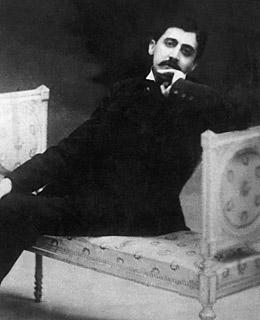Marcel Proust (Marcel Proust)

Marcel Proust was born in Auteuil (the south-western sector of Paris’s then-rustic 16th arrondissement) at the home of his great-uncle on 10 July 1871, two months after the Treaty of Frankfurt formally ended the Franco-Prussian War. He was born during the violence that surrounded the suppression of the Paris Commune, and his childhood corresponded with the consolidation of the French Third Republic. Much of In Search of Lost Time concerns the vast changes, most particularly the decline of the aristocracy and the rise of the middle classes, that occurred in France during the Third Republic and the fin de siècle. Proust’s father, Adrien Proust, was a prominent pathologist and epidemiologist, studying cholera in Europe and Asia. He wrote numerous articles and books on medicine and hygiene. Proust’s mother, Jeanne Clémence Weil, was the daughter of a wealthy Jewish family from Alsace. Literate and well-read, she demonstrated a well-developed sense of humour in her letters, and her command of English was sufficient to help with her son’s translations of John Ruskin. Marcel Proust was raised in his father’s Catholic faith.[6] He was baptized (on 5 August 1871, at the church of Saint-Louis d’Antin) and later confirmed as a Catholic, but he never formally practiced that faith. He later became an atheist and was somewhat of a mystic. By the age of nine, Proust had had his first serious asthma attack, and thereafter he was considered a sickly child. Proust spent long holidays in the village of Illiers. This village, combined with recollections of his great-uncle’s house in Auteuil, became the model for the fictional town of Combray, where some of the most important scenes of In Search of Lost Time take place. (Illiers was renamed Illiers-Combray in 1971 on the occasion of the Proust centenary celebrations.)
In 1882, at the age of eleven, Marcel Proust became a pupil at the Lycée Condorcet, but his education was disrupted by his illness. Despite this he excelled in literature, receiving an award in his final year. Thanks to his classmates, he was able to gain access to some of the salons of the upper bourgeoisie, providing him with copious material for In Search of Lost Time. Despite his poor health, Marcel Proust served a year (1889–90) enlisted in the French army, stationed at Coligny Barracks in Orléans, an experience that provided a lengthy episode in The Guermantes’ Way, part three of his novel. As a young man, Proust was a dilettante and a social climber whose aspirations as a writer were hampered by his lack of self-discipline. His reputation from this period, as a snob and an amateur, contributed to his later troubles with getting Swann’s Way, the first part of his large-scale novel, published in 1913. At this time, he attended the salons of Mme Straus, widow of Georges Bizet and mother of Proust’s childhood friend Jacques Bizet, of Madeleine Lemaire and of Mme Arman de Caillavet, one of the models for Madame Verdurin, and mother of his friend Gaston Arman de Caillavet, with whose fiancée (Jeanne Pouquet) he was in love. It is through Mme Arman de Caillavet that he made the acquaintance of Anatole France, her lover.
In an 1892 article published in Le Banquet entitled “L’Irréligion d’État” and again in a 1904 Le Figaro article entitled “La mort des cathédrales”, Proust argued against the separation of church and state, declaring that socialism posed a greater threat to society than the Church and emphasizing the latter’s role in sustaining a cultural and educational tradition. Marcel Proust had a close relationship with his mother. To appease his father, who insisted that he pursue a career, Proust obtained a volunteer position at Bibliothèque Mazarine in the summer of 1896. After exerting considerable effort, he obtained a sick leave that extended for several years until he was considered to have resigned. He never worked at his job, and he did not move from his parents’ apartment until after both were dead. His life and family circle changed markedly between 1900 and 1905. In February 1903, Proust’s brother, Robert Proust, married and left the family home. His father died in November of the same year. Finally, and most crushingly, Proust’s beloved mother died in September 1905. She left him a considerable inheritance. His health throughout this period continued to deteriorate. Proust spent the last three years of his life mostly confined to his bedroom, sleeping during the day and working at night to complete his novel. He died of pneumonia and a pulmonary abscess in 1922. He was buried in the Père Lachaise Cemetery in Paris.
Born
- July, 10, 1871
- Auteuil, France
Died
- November, 18, 1922
- Paris, France
Cause of Death
- pneumonia and a pulmonary abscess
Cemetery
- Cimetière du Père Lachaise
- Paris, France



